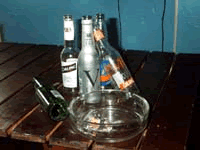







Is alcohol becoming societies most acceptable drug and is it becoming a problem with devastating effects?
According to Alcohol Concern alcohol misuse is costing the NHS £3 billion a year, with over 28,000 hospital admissions caused by alcohol dependence or poisoning.
Julie Dobson and Sue Coggins, Nurse Managers for Confidential Health Advisory Team (CHAT) at Warrington Collegiate Institute said 80% of crime is alcohol related. This statistic alone should be cause for concern.
Alcohol has become more accessible and socially acceptable. Alcohol Concern said: "30,000 people die each year from alcohol related causes, according to the government's own figures, compared with 2,3000 from drugs."
Throughout education young people are bombarded with information about the effects of alcohol consumption and drugs. But is this information doing its job?
Sue Coggins and Julie Dobson believe that lack of education is not the cause of increased drinking amongst young people today, as they believe the problem lies with the media and peer pressure. Although it is possible that the information is not presented in a manor that reaches the young generation.
Alcohol Concern said: "There is clear evidence of a lower incidence of unplanned pregnancies and sexually transmitted infections amongst people in areas where there is impartial and practical advice and information about the links between alcohol and sex.
"And this generally means material produced in a style that young people can relate to."
It seems that Britain is producing an alcohol generation where it is cool, acceptable and expected among young adults. As a result alcohol can become a way of living, an image, a way of reliving stress and it is increasingly becoming a sociable accessory, especially in universities.
Alcohol is responsible for several deaths and injuries each year in Britain The dangers are put aside, while you dance the night away consuming shot after shot every weekend poisoning your body.
Alcohol Concern's Director Eric Appleby said: "Clearly there is something about the British way of drinking that is resulting in people developing serious health problems younger than ever before."
Alcohol Concern agrees that binge drinking at weekends is becoming a health crisis.
Sue Coggins added: "Binge drinking is very dangerous. Your liver can actually only tolerate a certain amount of poison toxin and once you go over the limit you can cause serious damage to your liver."
The dangers of alcohol have been hidden behind the image presented in advertising and the media. Alcohol Concern estimates that drink companies spend £230 million on advertising. Drinking is seen as the norm a socially acceptable habit with no questions asked once you turn 18.
Sue Coggins said: "The subliminal advertising programs such as the soaps is worrying as it portrays alcohol as 'it being the thing to do'. It is portrayed as sexy, glamorous and fun."
The reality is not so glossy. Binge drinking and excessive drinking in the week is a problem that should be recognised.
According to Sue Coggins by exceeding the recommended units per week it can cause long-term damage to your organs and mental state.
Sue Coggins said: "The main organ to be damaged is the liver, however you can equally cause damage to the kidneys because they have to get the toxins out of the system, overdrive in the kidneys causes blood pressure to rise.
"This has a backlog on the heart, the heart starts to fail and it stops circulating the blood around the body and less oxygen gets to the brain. This increases risks of strokes and coronary heart disease."
A person's mental state can be dramatically effected by continuous alcohol consumption.
Sue Coggins said: "Alcohol effects your thinking, you a more likely to be depressed, suffer from sleep problems and weight problems.
"Many students who want to loose weight can't and it is not what they are eating it is what they are drinking. The amount of hidden calories in alcohol is horrendous and it is empty calories so you can't burn it off."
The concern should not only be about what the alcohol will do to your body, but what you will allow your body to go through when you are intoxicated. Once a person looses their inhibitions dangerous life threatening and harmful situations arise.
Sue Coggins said: "The main danger is lowering your inhibitions, as nurses we see the consequences of that, which is an increase in sexually transmitted infections such as chlamydia.
"This is because a person is less likely to use a condom, less likely to choose the partner that they have sex with, unknown to who that partner has had sex with before.
"Because you are not using contraception this then leads to unplanned pregnancy, possibly a termination, the responsibility of looking after a person for the rest of your life or dealing with the consequences of adoption. This can be extremely distressing."
Death is something a person rarely associates with a night out at the local bars and pubs, but it is something that is a reality for some who have become a victim of alcohol misuse by not fully knowing how much they can tolerate.
Sue Coggins said: "There can be serious fatal accidents because of alcohol such as falling over, breaking bones and head injuries, all of which can lead to death."
One of the most common terrifying incidents drunkenness causes is asphyxiation. A person whom is completely intoxicated falls asleep on their back, vomits, inhales their vomit, chokes and dies.
Sue Coggins said: "We found new students, 18 years old, arriving onto campus with liver damage and high blood pressure caused by drinking from a very early age. This was mainly young men.
"The problem is that it is not seen as such a danger and there is more deaths related to alcohol than heroin and there are more alcohol addicts than heroin addicts."
The sensation that alcohol gives people is possibly the main attraction as it increases confidence and creates a sense of well being, although this false sense security is what leads to violence and sexual encounters that you would not dream of engaging in if you were sober.
Alcohol Concern warn that young people are twice as likely to have unprotected sex under the influence of alcohol, which lead to unplanned pregnancies and sexually transmitted infections.
The university campus at Warrington is experiencing the consequences of alcohol misuse.
Sue Coggins said: "We do see violence as a consequence of alcohol as we have seen the damage here at Padgate campus. There is definitely an increase in violence.
"Sexually transmitted diseases are on the increase this is because when people are drunk they are not thinking things through."
The campus is constantly experiencing outbreaks of clamydia, which is currently more than the national average. Julie Dobson advises that people shouldn't have to stop drinking just do it safely, know you personal limit so that you can deal with your behavior and drink in moderation.
This is your responsibility and your individual choice to recognise the dangers and see through the glamour that is portrayed in the media and appreciate the harsh facts, that alcohol can induce depression, liver disease, increased risk of contracting a sexually transmitted infection, unplanned pregnancy, violence and death.
By recognising that alcohol is a drug that can have devastating affects and learning to stay within the suggested units, could save your life and your sanity.




